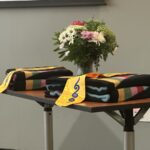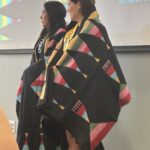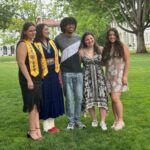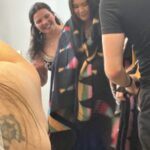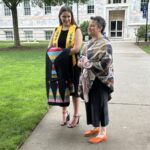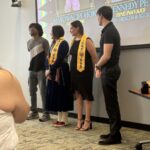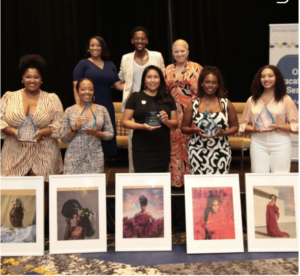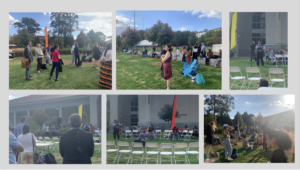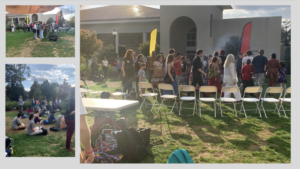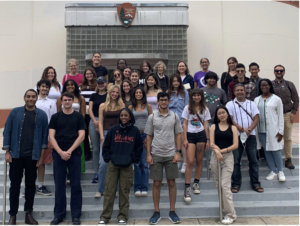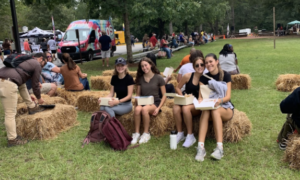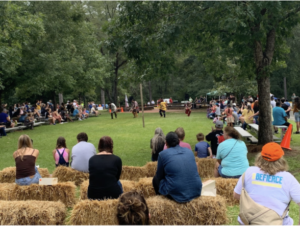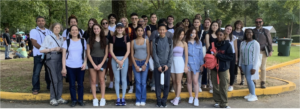Congratulations to Tre Harp III on graduating from Emory!
Category Archives: Voices and Viewpoints
Congratulations to the 2024 Graduates!
Kennedy Pete and Matowacipi Horse have left an incredible impact on Emory’s campus. The NAISI departement held their annual Celebration of Native American and Indigenious Graduates to celebrate their achievements, journey, and community they have carried throughout their academic career. Now, Kennedy and Matowacipi stride into their lives as Emory alums.
Emory News Reports Student Kennedy Pete amplifies Native voices across campus
Emory News Center highlights student Kennedy Pete’s legacy at Emory. She looks back a her path to Emory, how she cemented her place on campus, and fostered community for Native students for years to come. Read her journey here: Emory News Center.
https://news.emory.edu/stories/2024/04/er_kennedy_pete_native_voices_12-04-2024/story.html
Dr. Melanie Frye Presents “Vnokeckv Omēcicen: Because of Love”
What does it mean for something to be “because of love”?
Melanie A. Frye addressed this big question on February 6 as she discussed her work with the Mvskoke (Creek/Seminole) Language and her Native youth language educational program with the Emory community. Language is inextricably tied to one’s history, community, and identity. As such, she began her lecture in the Mvskoke language, introducing herself as a citizen of the Muscogee (Creek) Nation, a member of the Bird Clan, and from her tribal town of Eufaula on the Canadian River.
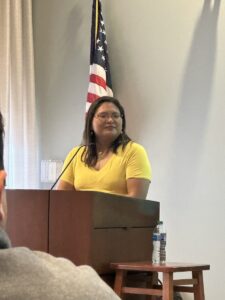 Mvskoke, like other Muskogean languages, roots itself in the Muscogee homeland and continues in five Mvskoke-speaking sovereign Nations in present-day Oklahoma. It is a language built on relationality between the speaker and their subjects. Just as clans hold dominant kinship and daughter towns maintain their ties to their mothers even after the Indian Removal Act of 1830. Some towns did not survive the displacement, however, their people carried on by reforming their kinships into new towns. Ancestral homelands still connect to Muscogee people today by functioning as ceremonial grounds.The Mvskoke word etvlwv translates into English as “tribal town” or “band” among Seminoles. . Etvlwv connotes that each town has a sovereign identity, with some like Thlopthlocco, receiving federal recognition as a tribal governance.
Mvskoke, like other Muskogean languages, roots itself in the Muscogee homeland and continues in five Mvskoke-speaking sovereign Nations in present-day Oklahoma. It is a language built on relationality between the speaker and their subjects. Just as clans hold dominant kinship and daughter towns maintain their ties to their mothers even after the Indian Removal Act of 1830. Some towns did not survive the displacement, however, their people carried on by reforming their kinships into new towns. Ancestral homelands still connect to Muscogee people today by functioning as ceremonial grounds.The Mvskoke word etvlwv translates into English as “tribal town” or “band” among Seminoles. . Etvlwv connotes that each town has a sovereign identity, with some like Thlopthlocco, receiving federal recognition as a tribal governance.
Frye reflected on her language journey. Her father–a first language speaker, her great uncle, Ms. Gloria McCarty, her mother–Margaret McCain Moulding, Mr. Galen Cloud, and Mrs. Linda Wood were her Mvskoke mentors, teaching her the grammar, structure, building blocks, and intricacies of the language. Frye has also worked with linguistics Dr. Jack Martin to compile a Mvskoke dictionary which can be accessed at the Emory Library. Frye’s linguistic journey continues at University of Oklahoma, teaching others the Mvskoke language. In teaching the language, Professor Frye initially focused on grammar, nouns, tenses, and verbs, but later transitioned to learning sentences and translations to increase student’s understanding. Now she emphasizes student interactions and building up functional Mvskoke such as verb conjugation which holds more significance compared to English. Frye led an example of sentence constructions and encoded meanings within Mvskoke. 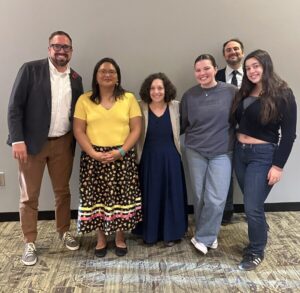
Not many Mvskoke citizens are first language speakers. The youngest native speaker was already in his 50s. She stressed the importance of Mvskoke youths and Indigenous youths at large to use their language as a part of their sovereignty and culture. No place is this more evident than her work with the youth of the Thlopthlocco Tribal Town. Frye explained that Thlopthlocco was the descendant of their mother tribal town Tukvpvcce. Thlopthlocco received federal recognition as a tribal government in 1939.
With a grant and permission from the Thlopthlocco elders, Frye runs a language and culture camp aimed to develop Native youth’s language and culture connections. For the 2023 session, Frye incorporated more culturally Mvskoke elements such as “Pipē Nocv,” a Mvskoke lullaby created during removal, and Luvc Hopoyet Ayvnks, a story written by Dr. Frye and edited by Mrs. Linda Wood based on “Pipē Nocv.” Over the three days students learned the lullaby through crafts, drawings, and recording themselves singing “Pipē Nocv.” Each student had physical memories of Pipē Nocv to encourage themselves to continue learning and sharing with their parents. As campers mature, Dr. Frye hopes to include these fluent speakers assisting her students during their cultural activities for this coming camp.
Because of love for her community, her language, and her descendants, she embarked on her mission to teach the next generation their history, their language, their culture, and hopefully inspire their future.
Click here to watch the full lecture: Vnokeckv Omēcicen: Because of Love
Click here to learn some Mvskoke words: Mvskoke (Creek) Language Chart
Click here to watch Introduction to Translanguaging, Language Reclamation, and Justice-Oriented Language Pedagogies
Emory Wheel Highlights Dr. Melenie Frye “Working With the Mvskoke Language”
The Emory Wheel highlighted Dr. Melanie Frye’s presentation Vnokeckv Omēcicen (Because of Love): Working with the Mvskoke Language discussing language’s relation to its people, their history, and their future to a community of Emory students, faculty, and staff.
Emory hosts Mvskoke language teacher in continuation of relationship with Muscogee Nation
Beth Michel Named Senior Associate Director for the Center for Native American and Indigenous Studies
Emory University’s Center for Native American and Indigenous Studies announces the appointment of Beth Michel as its Senior Associate Director.
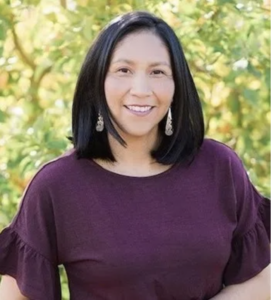 In this full-time leadership position, Michel will direct the Center’s strategic initiatives, continuing her work to foster thriving communities of Indigenous students, faculty, and staff at Emory, coordinate campus-wide programming and tribal community partnerships through events like the annual Muscogee Teach-In, and strengthen the development of a new minor in Native and Indigenous Studies.
In this full-time leadership position, Michel will direct the Center’s strategic initiatives, continuing her work to foster thriving communities of Indigenous students, faculty, and staff at Emory, coordinate campus-wide programming and tribal community partnerships through events like the annual Muscogee Teach-In, and strengthen the development of a new minor in Native and Indigenous Studies.
The Emory Center for Native American and Indigenous Studies launched in the Spring of 2023, building on Emory’s existing Native American and Indigenous Studies Initiative, which Ms. Michel directed. The Center for Native American and Indigenous Studies is dedicated to nourishing a vibrant intellectual community supports cross-disciplinary research and teaching, as well as opportunities for students to take coursework in NAIS and while respectfully engaging Indigenous communities.
“I am fortunate to continue building a space that embraces Native & Indigenous knowledge and supporting the strategic plans for the minor,” says Beth Michel as she steps into her new role.
Beth Michel is a proud citizen of the Tohono O’odham Nation as well as Hopi and Navajo. Previously, Michel served as Associate Dean of Undergraduate Admission and Office of Undergraduate Admission’s Lead for Native American Affairs at Emory University. Prior to joining Emory, Michel was an Indigenous evaluator at the Centers for Disease Control and Prevention (CDC), Division of Nutrition, Physical Activity and Obesity (DNPAO) as a contractor.
Michel received a Master of Public Health degree with a global health concentration from Rollins School of Public Health and a Bachelor of Science from the University of Arizona. In 2023, she was honored to receive the Women of Color Initiative (WOCI) Atlanta Collaborative in Higher Education Outstanding Atlanta Staff Impact Award.
NAISI Congratulates Associate Dean Beth Michel for receiving the Women of Color Initiative (WOCI) Outstanding Atlanta Staff Impact Award!
The WOCI Atlanta Collaborative in Higher Education, a strategic alliance encompassing prominent institutions such as the Center for Women at Emory, Clark Atlanta University, Georgia Tech’s Office of Minority Educational Development (OMED), Emory University Office of Diversity, Equity, and Inclusion, Spelman College Women Research and Resource Center, STEM Atlanta Women, Inc, Women’s Resource Center at Georgia Tech, and MiTek, comprises a comprehensive network dedicated to the advancement of women across industry, research, and higher education. Women of Color Initiative Awards are given each year to students, faculties, staff and community leaders who have made significant contributions towards social justice, advocacy, higher education, scholarly achievements, or and/or building communities. of upliftment. Nominees gathered at Georgia Institute of Technology to celebrate the tremendous achievements participants have done over within Atlanta.
Associate Dean Beth Michel was honored to receive Women of Color Initiative (WOCI) Outstanding Atlanta Staff Impact Award. She noted that she did not receive this award alone but on behalf of the colleagues working with her.
Dean Michel reflected on how wonderful it was to be among fellow women passionate about their work. One of her favorite experiences was the brunch communed by all the finalists and other participants of the event. Women ate and shared their effects in their communities, aspirations for growth, and methods of collaboration. Emory Alas de un Mismo Pájaro, a Latinx performing and education dance group, performed during the award celebrations.
Dr. Malinda Lowery, Cahoon Family Professor of American History, shares her time with Dean Michel, “Beth is a trusted and generous leader. I am beyond thrilled that she has received this long overdue recognition for her work at Emory and in the Atlanta community. It demonstrates her remarkable impact.”
The most important thing Beth wanted others to take away from her experience is the vitality of community. She did not arrive at the podium alone but alongside the effects of her department, colleagues, students, and many others who strive with like-minded goals of the future. Ms. Beth urges others to find those communities to build themselves and others up.
Emory News Highlights Dr. Debra Vidali’s 2023 Ethnographic Poetry Competition Win
NAISI congratulates Dr, Debra Vidali along side Emory News Center in her winning first place in the 2023 Ethnographic Poetry Competition of the American Anthropological Association’s Society for Humanistic Anthropology.
Photo Essay Celebrating Second Annual Muscogee Teach-In 2023
On October 27, NAISI and delegates from the Mvskoke Etvlwv celebrated the Second Annual Muscogee Teach-In.
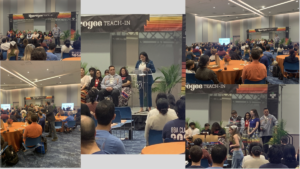
The Muscogee Teach-in opens with welcomes from Rev. Chebon Kernell, Tre’ Harp 25’C, Associate Dean Beth Michel, Mvhayv Eli Rowland, and Second Chief of the Muscogee Nation and his wife Del and Rhonda Beaver.
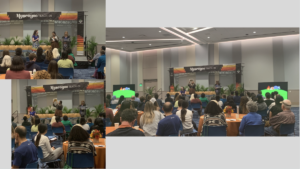
Mvhayv Jordan Squire and Carolyn McNac narratate Mvskoke stories while Mvhayv Eli Rowland acted them out. Audiences listened to these tales in Mvskoke joined to recite vocabulary and grammar like TOTKV (fire).
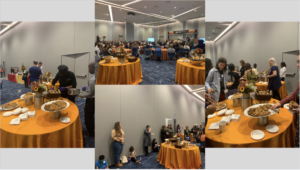
Emory students, staff, faculties, delegates of the Muscogee Nation, and guest sharing meals spanning multiple food customs for a shared plate.
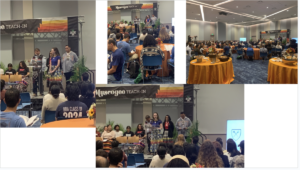
Rev. Kernell and Mvhayv Eli Rowland led in contemporary and traditional Mvskoke hymns. The audience followed along in their brochures.
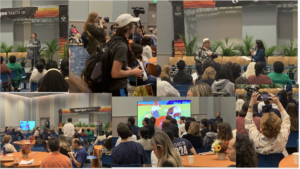
Artist Johnnie Diacon shares his childhood, what is meant for him to become an artist, his challenges and struggles of life, and how he was able to infuse those stories into his art.
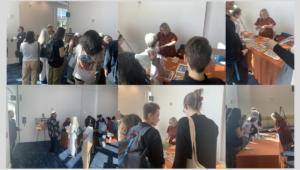
Nikki Diacon selling her husband’s art after his interview. She informs buyers the stories and process of each work, sharing their greater meanings to Emory art lovers.
Relational Accountability and Place-Based Learning: Emory Students Participate in 31st Annual Ocmulgee Indigenous Celebration
We start with gratitude, saying “mvto” (thank you) to the Este Mvskokvlke (Muscogee People) for welcoming Emory students, faculty, and families to one of their most sacred sites in their ancestral homeland at the 31st Ocmulgee Indigenous Celebration on September 17, 2023.
Traveling from Emory to Ocmulgee Mounds National Historic Park for a special place-based and community-engaged learning experience, a first-time interdisciplinary cohort of thirty-five faculty and students from Dr. Debra Vidali’s Anthropology 190–Land, Life, and Place, Dr. Loren Michael Mortimer’s History 285–Introduction to Native American History, Heidi Aklaseaq Senungetuk’s Music 460RW–North American Indigenous Music and Modernity, and Emory’s Native American Student Association participated in a vibrant celebration of Southeastern Native American cultures and heritage. This marks the first time Emory University organized an official trip to the Ocmulgee Mounds National Historic Park.
Emory students experienced a diverse array of activities that showcased the rich heritage of the region’s Indigenous peoples. Traditional cultural crafts, captivating storytelling sessions, and educational programs provided students with meaningful connections to the living histories and thriving communities of diverse southeastern Native American people. “This was my first time at the Ocmulgee Mounds,” says senior Matowacipi Horse (C24’). “This was an incredible experience seeing the natural landscape, even in the ways it has been recreated to pay tribute to the original ancestral homeland. I think it was a beautiful step in the work of reparations. Seeing the stories–and even trying the food–it was incredible.”
This celebration represents a collaboration with the Muscogee Nation and the Ocmulgee Mounds Association to enact Mvskoke sovereignty and educate visitors about the Indigenous presence on the land. “It was really cool how we got to interact,” reflected Mira Maukadam (C27’), “and explore the mounds.”
Today, the mounds are a reminder of Muscogee origins, a site of exchange, and a symbol of their continued presence in their ancestral homelands. Marta Yavorsky Delgado (C27’) said “I loved seeing all the historic sites and all the trails.” Entering the mounds ground, history and anthropology students read interpretive markers “against the grain,” interrogating the biases and assessing historical accuracy.
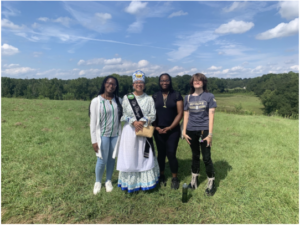
Jessanya Holness, Licia Brown, and Morgan Crosswhite enjoy a candid conversation with Miss Muscogee Chenoa Barnett.
In the Mvskoke creation story, the people emerged from a blinding fog, found another, and became a nation at Ocmulgee. Now, rising generations of learners made new connections with one another in the heart of this ancestral space. In one notable conversation atop the site’s largest mound, Emory students met Miss Muscogee Nation Chenoa Barnett who shared her experience as Miss Muscogee Nation and her goal to become a Mvskoke educator. As a student at the College of Muscogee Nation, she shared her college experiences, aspirations for the future, and life stories with her peers from Emory University.
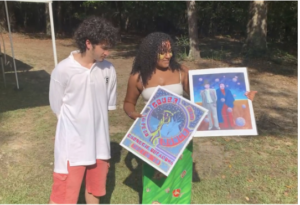
Royce Mann and Jaanaki Radhakrishnan admire prints by renowned Mvskoke artist Johnnie Diacon, whom they met the at the Indigenous Celebration.
The cultural programming centered on storytelling, music, stickball, education stations, food, and tours of the mounds. One food station sold frybread which students enjoyed. Neeraj Painitkar (C27) said they “loved coming to this festival and seeing Indigenous cultures so vibrant and alive. It’s just really inspiring.”
Students, faculty, and visitors engaged with each event presented at their own pace, learning through observations of the presenters and building connections with the individuals at the education tables. Carter Douglas-Brown (C27’) observed that “it was really cool to be here and to see all the things in person that we are learning about in class.”
Ocmulgee Mounds remains a space that gives life to Indigenous creativity. Dr. William Harjo (Mvskoke) shared a piece of music he worked on called Dragonfly Song which attracted dragonflies. Throughout the day, dragonflies gathered around passerbyers, strengthening the connection between the Mvskoke continuous knowledge and the ecological knowledge of the mounds. Ted Wilson (C25’) reflected, “it was really cool that we were able to come and
experience this today with the Muscogee Nation. I’m really grateful that they came all this way to share their stories and traditions with us and it was a fun day to be here and be able to come here.”
Dr. Harjo also shared the story of the strawberry. First man and woman got into an argument resulting in the first woman leaving their home. For several days the first man waited for her return, but she never came back. After some time he went out to look for the first woman, passing by scattered white flowers as he went. Soon he had found her and they both were relieved to see each other. As they left together, strawberries bloomed on the flowers they passed. Strawberry has been a symbol of strengthening romance ever since.
NVNVHI Warriors of the Eastern Band of Cherokee Indians shared their efforts to pass on their way of life to the next generations through the ever-present teachings of the elders. Lessons are passed down wherever the elders and youth are together and memories or instructions are rekindled. The NVNVHI Warriors of the Eastern Band of Cherokee performed the Warrior’s Dance, one of the oldest ceremonial dances passed down across generations.
Emory Art and Social Justice Fellow Heather “Bird” Harris led a group of students onto the nature trail for a Radical Noticing Walk. This is a part of her wider work with the Arts and Social Justice Program and her “Land as Living Memory” project with students in History-285: Introduction to Native American History.
Emory students continued their work of relationship building and place-based inquiry back on campus. Robin Barker, Lead Interpretive Ranger for Ocmulgee Mounds, made a virtual class visit to Anthropology 190 on September 27. Students shared their experiences and key teachings from their participation in the Indigenous Celebration. Barker updated students on the ongoing work of consultation with Tribal nations as part of the park’s effort to repair relationships, revise interpretive wayside markers, and bring existing exhibits into compliance with the Native American Graves Protection and Repatriation Act. Students were welcomed to share their deeply researched critical analysis of interpretive wayside markers, actively participating in a generative dialogue about place-based storytelling and decolonial stewardship of National Parks. Ranger Barker invited students to continue the conversation in person at their next visit to Ocmulgee Mounds or consider continuing this work through future internships or volunteer opportunities on-site.
This special experiential learning opportunity was made possible with support and co-sponsorship from the Native American and Indigenous Studies Initiative, the Department of Anthropology, the Music Department’s Friends of Music Student Research fund, Emory College of Arts and Sciences pedagogy mini-grants, and the Department of History.




